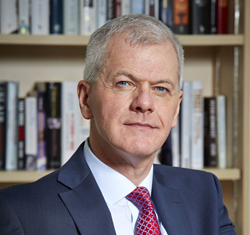"Take politics out of schools' policy" and "put trust in frontline" says Sir David Bell
Release Date 09 January 2015

- Vice-Chancellor Sir David makes President's address to the Association of Science Education's Annual Conference
- Sir David criticises "dangerous experiment" to split practical science marks from final A-levels and GCSEs grades
- Former Chief Inspector of Schools and Permanent Secretary calls on cross-party backing for measures to "depoliticise" policy
A-levels should be replaced with a broader, deeper baccalaureate and a new independent commission set up to drive national curriculum and testing policy in future, Vice-Chancellor Sir David Bell proposes in a major speech today [Friday 9th January 2015].
Speaking at the Association of Science Education's (ASE) Annual Conference in his first address as its new President, Sir David calls for cross-party backing for a programme to "depoliticise" policy-making, which will benefit the long-term interests of the economy and society.
Download Sir David Bell's speech to the ASE Annual Conference 2015
Sir David argues that science education is vital to the long-term economic growth and building a high-skill economy - arguing that there is an "umbilical cord" between teaching in the classroom and university research institutions.
But, he said the system is held back by teachers being subjected to constant short-term policy and structural changes driven by the electoral cycle and political firefighting - which he says undermines the science and innovation base in the UK.
The former Department for Education Permanent Secretary argues that "monolithic" Whitehall departments are too remote from schools to be cost-effective or efficient in managing the system. He also says that given the scale of public finance cuts and the public's anti-politics mood, the state must rethink its relationship with the schools sector - by devolving power and trusting to frontline teachers, Higher Education and industry.
Separately, Sir David believes Ofqual's proposals on stripping out practical science marks from the full A-level and GCSE science grades is a "dangerous experiment". He warns it risks devaluing practicals; cutting science department budgets; and lowering the quality of first-year undergraduates.
To summarise his speech, he calls for cross-party backing for:
- A new, permanent, independent strategic advisory body to oversee curriculum and assessment policy - Sir David suggests a potential model is Sir John Armitt's proposal for an independent National Infrastructure Commission, which would set long-term priorities on all significant transport, energy, regeneration and environmental projects - with a full reassessment every 10 years adopted by government, underpinned by detailed monitoring and annual reports to Parliament. The Making Education Work report last January, which Sir David advised on, suggested a similar model.
- A moratorium for the next Parliament on new schools legislation and any major new structural changes to the National Curriculum and qualifications systems, on top of existing planned reforms.
- The slimming down of the Department for Education's remit radically - refocusing it on giving overall strategic direction.
- A long-term plan to expand A-levels into a "broader and deeper" baccalaureate-system - with core specialisms supplemented byextended project work; top-level literacy, numeracy, computer science for all; and softer, non-cognitive skills. Sir David criticises the current government for retaining an "out-of-date" system when the economy and society "can least afford it".
- TheSchool Direct teacher training system to be formally reviewed after the General Election, to stop "good, proven" university post-graduate courses being put at risk.
Sir David Bell was HM Chief Inspector of Schools at Ofsted from 2002 to 2005 and Permanent Secretary at the Department for Education from 2006 to 2011. He became Vice-Chancellor of the University of Reading in January 2012. Sir David began his career as a primary school teacher and later became a head teacher, before moving into local government.
The ASE Annual Conference 2015, Europe's largest science education conference, is being held at the University of Reading this week.
About ASE
The ASE is the UK's largest subject association and is dedicated to everyone involved in science education. Members include teachers and technicians who are passionate about their profession.
The ASE aims to provide an independent, powerful voice for the science education community while delivering dedicated support for its members.